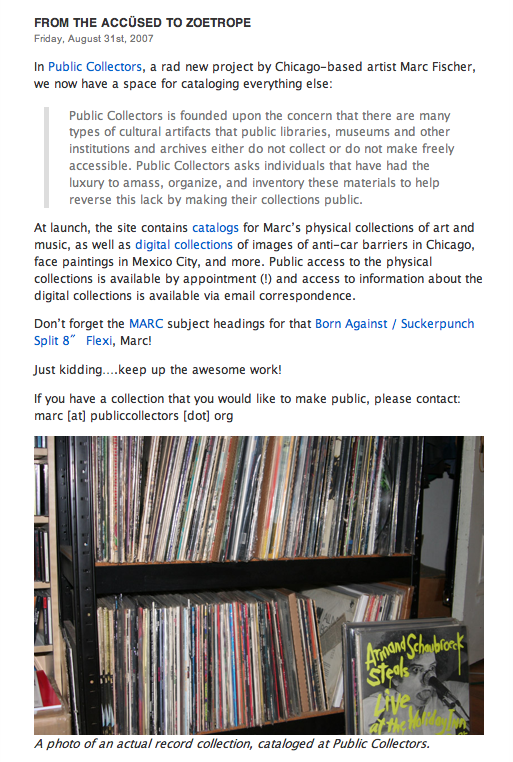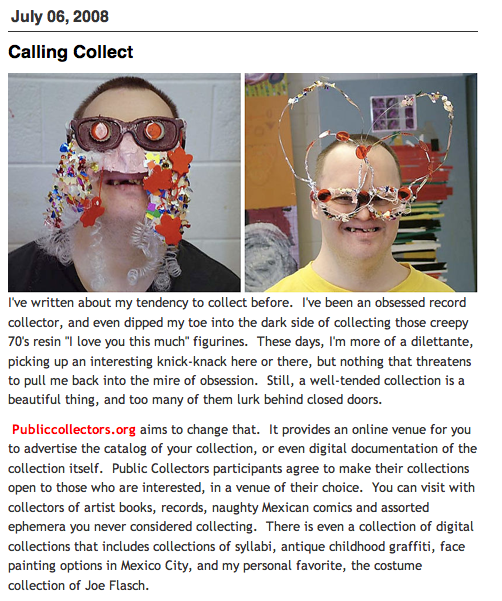
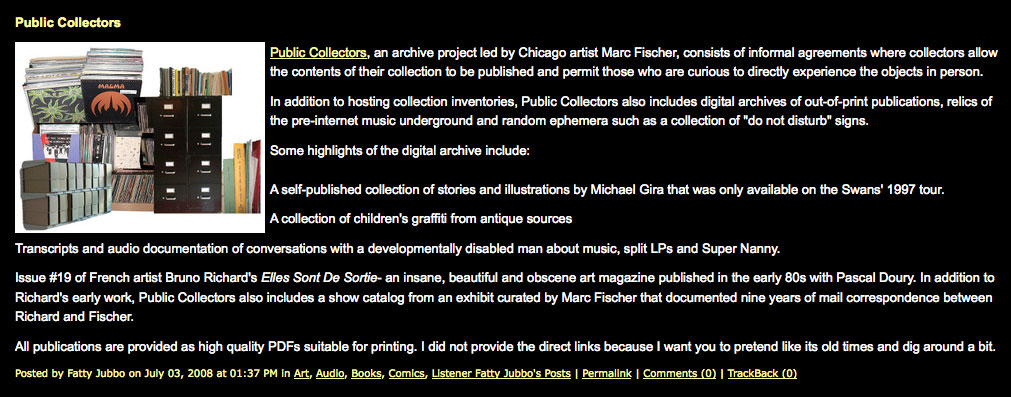
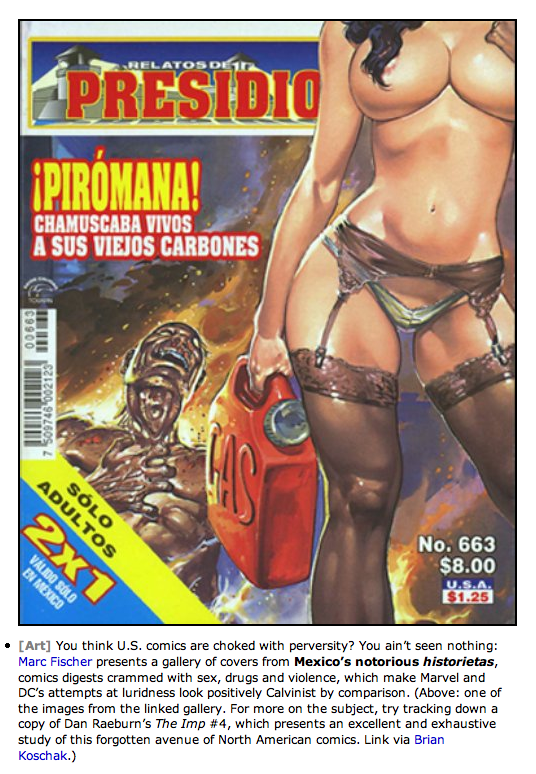
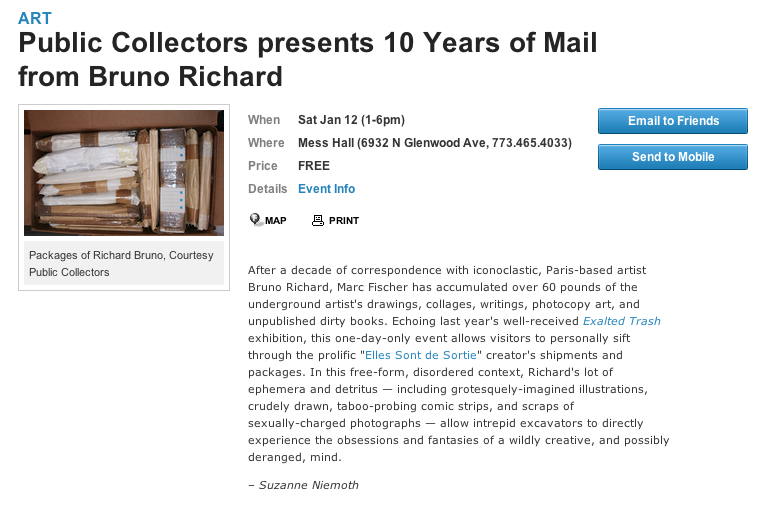
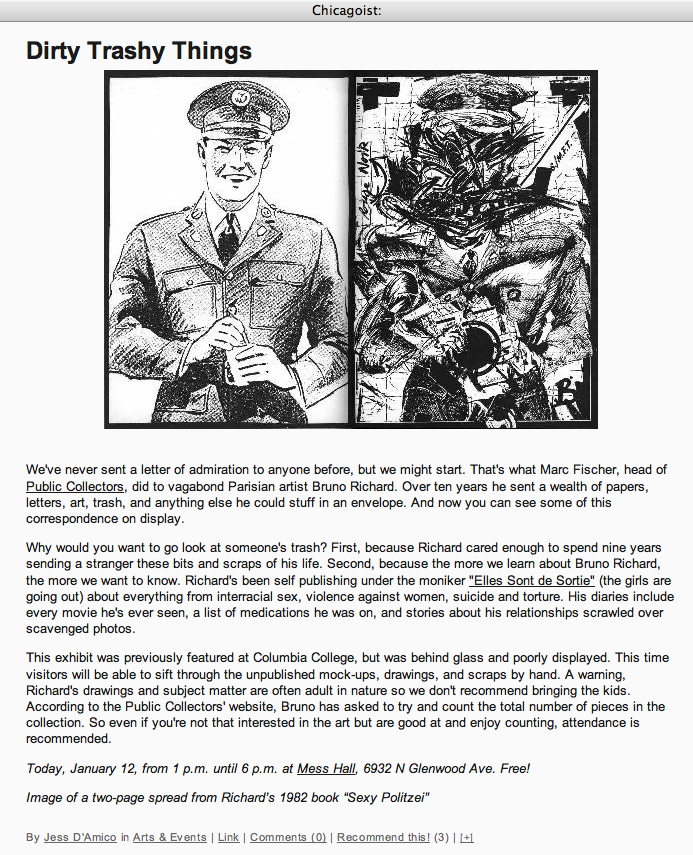
I was interested in Marc’s work because my own project, the Mobile Museum, has the same mission. I believe the Mobile Museum leans more towards an identity that alternates between a sort of typical collection housing museum and a gallery-type show space. (more about the Mobile Museum is available at www.mobilemusem.org)
Marc’s project is specifically about sharing collections that cross all areas of interest and bringing them into a setting that creates a new format for examining them. This new format is that of the museum context, specifically the art museum context. The identity of the collector becomes more fluid as well. In Marc’s project, I found my self thinking of the collectors as artists and poets too, albeit strange object or image poets.
Public Collectors features Fischer’s own collection of records as well. The description on his collection page reads:
“Would you like to see or hear something on this list?”
“Contact: marc [at] publiccollectors [dot] org Let me know what you are interested in or curious about. I’ll give you my phone number and we can set up a meeting time that is mutually convenient.
You can then come on over and listen to the record(s) you want to hear. Headphones will be provided if desired. My tolerant neighbors will not mind if we crank up the stereo.
Never used a turntable before? It’s okay. I’ll show you how.
Records are not for sale.”
Other collections include stolen bibles, Do Not Disturb signs, face painting options in Mexico city, and documentations of things left behind when a man’s son comes to visit and then leaves with his mother (a bit melancholy, but striking in its own way).
Fischer’s project is of interest to me, as is his overall practice because of the way in which he searches for a means to accredit the work an individual has chosen to undertake. Fisher’s Public Collectors rewards and acknowledges accomplishments in a fashion that encourages me to ask, “Why are certain institutions the only ones who can hand out degrees and create rituals of legitimacy?”
Fischer also encourages a sort of encounter between collector and viewer that will entail a more intimate experience than the museum offers. The name of the game here is specificity, authenticity, and perhaps most importantly, the suggestion that a straightforward and sincere presentation of someone’s life’s work is a valuable cultural contribution, existing in its own right in a manner that makes critique in relation to a typical philanthropically powered museum irrelevant.
“Collectors can accommodate viewers at whatever location is most comfortable or convenient for them. If their collection is portable or can be viewed in a location other than the collector’s home, this would still be an appropriate way to participate in the project.”
The underlying sentiment here is one that the parties involved in an exchange of information and experience are those most appropriate to judge its quality. A critique of the perhaps class-specific tastes of museums is brought up too:
“…there are many types of cultural artifacts that public libraries, museums and other institutions and archives either do not collect or do not make freely accessible. Public Collectors asks individuals that have had the luxury to amass, organize, and inventory these materials to help reverse this lack by making their collections public.”
Here, the tables are turned in way that is crucial to understanding the Public Collectors Project. Museums promote themselves as centers of comprehensive cultural and historical wealth. Often times, the museum is even an extension of a particular individual or group of individual’s effluence and education, neglecting to represent other races, classes, and genders in any sufficient way.
I acknowledge the merit of many collections and visit museums frequently myself- however I also sit on the bus and have conversations with the guy who wants too go but can’t really afford it. His position is one of experiencing a lack of means to access information, and also, a inability to connect his own personal story and understanding to others beyond his immediate social circle.
All too easily, vast amounts of information are accumulated and lost because there is not a space or means to record the accomplishments of the middle and lower class. These groups find themselves in positions where acquiring an education and climbing social or economic ladders are necessary for quality of life. These groups are perhaps most likely to both offer relevant information as well as benefit from the wisdom of others like themselves, to improve their understanding of the world and how it works.
Fischer’s work is hopefully one of many efforts to gather up the revelations and insights of the common collectors, who driven by curiosity create street-level records of cultural phenomena traditional museums might overlook.
